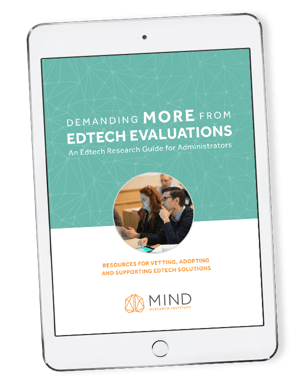 Ebook: Demanding More from Edtech Evaluations
Ebook: Demanding More from Edtech Evaluations
Resources for vetting, adopting and supporting edtech solutions
For quite some time now, the traditional approach to edtech evaluation—the goals, the conventional process, the vetting, description and use—has been broken. Because of this, administrators can be easily confused or misled by the scarce credible information about program effectiveness. Yet every school year, they still need to make decisions about what tools or programs to source, select, purchase, adopt and support in their schools and districts.
This ebook gathers together content from MIND’s podcasts, blogs, webinars, videos and more into a single, easy-to-digest resource aimed at equipping administrators to expect and get more out of current and future edtech research.
We’ll explain the key components of research of which everyone should have a baseline understanding. And we’ll provide you with resources that will help you ask better questions and make more sense of the edtech research that’s out there, including our own.
In this guide you'll learn about:
- The disconnect between ESSA & edtech evaluation
- The problem with the “One Good Study” paradigm
- Why ESSA’s tier system is only the first step
- The lack of long-term accountability
- Repeatable results at scale
- What questions you should be asking when looking at edtech solutions
About the Author:

Andrew Coulson, Chief Data Science Officer
Andrew Coulson leads a team of data analysts to conduct evaluations of student and teacher usage and outcomes of ST Math. He previously led MIND’s education division for 12 years, where he helped to execute strategies to scale the organization’s reach to over one million students. Prior to joining MIND, Coulson was the first education program officer for a major Orange County foundation, and also worked for 17 years in upper management in high-tech manufacturing engineering. Coulson holds a master’s degree in physics from UCLA.
